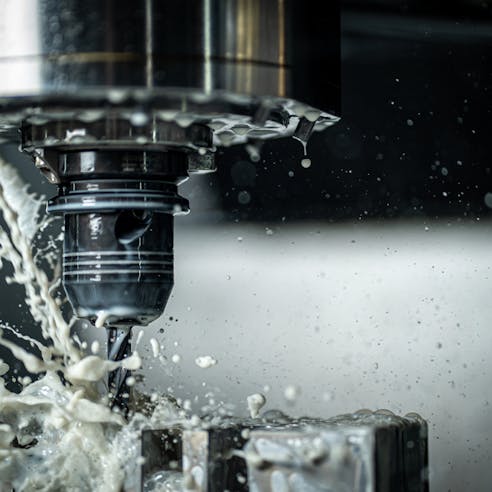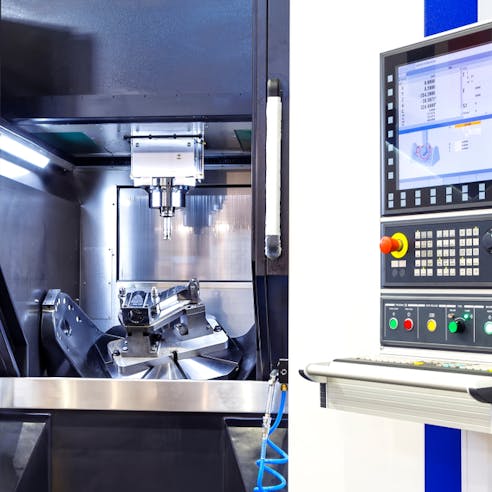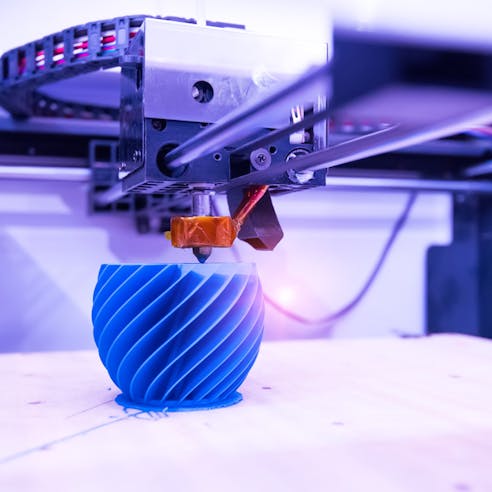High Volume CNC Machining Services by Xometry
High Volume CNC Machined prototypes and production parts in days | AS9100D | ISO 9001:2015 | ISO 13485 | IATF 16949:2016 | ITAR Registered | Free standard shipping on all US orders
High-volume CNC machining caters to the demands of diverse industries that require mass production of precise components. It has become the go-to method for turning raw materials into finished products with remarkable consistency. The automation of processes ensures continuous and rapid production without the need for constant human intervention. This efficiency translates to a competitive edge for businesses in meeting market demands and staying ahead in dynamic industries.
At Xometry, high-volume CNC machining is the go-to solution for versatile and efficient manufacturing. With a broad array of materials and advanced technologies at our disposal, we can meet the demands of large-scale production while maintaining the high-quality standards required in today's competitive market. Our expertise in CNC machining, coupled with automation and multi-axis capabilities, empowers us to deliver top-notch components across diverse industries, ensuring our client’s success and satisfaction.
High-Volume CNC Machining Process
Xometry’s high-volume CNC machining process is a well-structured approach that ensures efficiency, precision, and consistent quality throughout the entire production cycle. The process begins with a thorough project assessment, during which we collaborate closely with our clients to understand their specific requirements, technical specifications, and desired outcomes. Once the design is finalized, our team of skilled programmers takes over. We use advanced Computer-Aided Manufacturing (CAM) software to convert the design into machine-readable code. With the program ready, we move on to selecting the appropriate tooling for the CNC machines. Our extensive inventory of cutting tools, drills, mills, and other necessary implements ensures that we are equipped to handle a wide range of materials and component geometries.
The full-scale production phase commences after successful tooling and setup. Our state-of-the-art CNC machines, operated by highly skilled technicians, work tirelessly to manufacture the components according to the programmed instructions. The automated nature of CNC machining allows for continuous production, significantly reducing lead times for high-volume orders. At every stage of the high-volume CNC machining process, we maintain a robust system of quality control and quality assurance. Our team conducts comprehensive tests and inspections to verify the components' accuracy and functionality. Any deviations or discrepancies are immediately addressed, and if required, corrective actions are taken to maintain the highest level of quality.

Materials and Technologies Used in High-Volume CNC Machining
High-volume CNC machining caters to diverse industries and applications. To efficiently and accurately produce components, a wide range of high-performance materials are used including: metals (aluminum, stainless steel, steel, brass, copper, and titanium) and plastics (ABS, nylon, PEEK, and polycarbonate). Integrating automation and multi-axis machining are also utilized to enhance productivity and flexibility in the production process.
Advantages of High Volume CNC Machining
Listed below are the advantages of high-volume CNC machining:
- Fast Machining Speed
- Consistent Quality
- Scalability
- Reduced Lead Time
- Overall Cost Savings

Fast Machining Speed
High-volume CNC machining utilizes advanced computer-controlled machines that can execute machining operations at significantly higher speeds than traditional manual methods. The automation and precision of CNC machines allow for continuous production without the need for frequent manual intervention. This accelerated machining speed translates into shorter production timelines.
Consistent Quality
The automated nature of CNC machines ensures consistent and repeatable results with every production cycle. The use of programmed instructions eliminates human errors and variations that might occur with manual machining processes. This consistency in quality is essential for large production runs, as it ensures that each component meets the required specifications and maintains a high standard of performance.
Scalability
Manufacturers can easily adjust production volumes by modifying the CNC program and tooling setups to match changing requirements. Whether the production needs to be scaled up to meet higher demand or scaled down during periods of lower demand, CNC machining allows for flexibility without compromising efficiency or quality.
Reduced Lead Time
The combination of faster machining speed and consistent quality in high-volume CNC machining leads to significantly reduced lead times for large production runs. With efficient automation and optimized tool paths, components can be manufactured rapidly and reliably. Shorter lead times provide a competitive advantage, enabling manufacturers to deliver products to market quickly and respond swiftly to customer demands or unforeseen changes in requirements.
Overall Cost Savings
The automated nature of CNC machines reduces the need for labor-intensive manual work, leading to decreased labor costs. Additionally, CNC machines can minimize material waste through precise machining, optimizing material usage, and reducing raw material expenses. The elimination of human errors also minimizes costly rework and scrap, further contributing to cost savings. Over time, these efficiencies result in a more cost-effective production process.
High-Volume CNC Machining Industries
Listed below are the key industries that are well-suited for high-volume CNC machining:
- Automotive Industry
- Aerospace Industry
- Electronics
- Medical Industry
- Industrial Applications
- Consumer Electronics
- Energy and Power Generation

Automotive Industry
CNC machining ensures high-quality and precise production at scale for engine parts, transmission components, brake systems, and intricate interior and exterior components. The automotive industry relies on the efficiency and consistency of CNC machining to meet the demands of mass production while maintaining strict quality standards.
Aerospace Industry
High-volume CNC machining is instrumental in manufacturing critical aerospace components, such as: aircraft engine parts, landing gear components, structural elements, and avionics parts. The ability of CNC machines to work with various materials, including aerospace-grade alloys and composites, makes them indispensable for this technologically advanced and safety-critical industry.
Electronics
The electronics industry requires intricate and miniaturized components, often in large quantities. High-volume CNC machining offers the precision needed for manufacturing complex electronic parts, such as: connectors, heat sinks, housings, and electronic enclosures. CNC machines excel at producing precise features and tolerances required in the electronics sector, in which even minor deviations can have significant impacts on performance.
Medical Industry
High-volume CNC machining is utilized for producing medical devices and components, such as: surgical instruments, orthopedic implants, prostheses, and dental components. CNC machining ensures that medical devices meet stringent regulatory requirements while maintaining exceptional accuracy and quality.
Industrial Applications
High-volume CNC machining finds application in the production of industrial machinery parts, automation components, hydraulic and pneumatic systems, and tooling. CNC machining's ability to handle a wide range of materials, from metals to plastics, makes it versatile and suitable for various industrial applications.
Consumer Electronics
In the consumer electronics sector, high-volume CNC machining is crucial for producing components for smartphones, laptops, gaming consoles, and other electronic gadgets. CNC machines can create precise and intricate designs, ensuring seamless functionality and aesthetic appeal in consumer electronics products.
Energy and Power Generation
The energy and power generation industries also benefit from high-volume CNC machining. CNC machines are used to manufacture parts for turbines, generators, compressors, and other equipment used in power plants and renewable energy installations.
Alternatives to High-Volume CNC Machining Services
Clients seeking alternatives to high-volume CNC machining services have several manufacturing processes to consider, each with its own strengths and applications. Some of the notable alternatives are:
- Injection Molding
- 3D Printing
- Stamping
- Casting

- Injection Molding: Injection molding is a widely used manufacturing process for producing high volumes of plastic parts with precision and consistency. It is an efficient method for mass-producing intricate and complex geometries, making it ideal for industries like: automotive, electronics, consumer goods, and medical devices.
- 3D Printing: 3D printing, or additive manufacturing, builds objects layer by layer from digital 3D models. Although traditionally used for prototyping and small batches, advancements in 3D printing now enable limited high-volume production. It is beneficial for highly customized and unique parts or when rapid iteration and design changes are required.
- Stamping: Stamping involves forming sheet metal into desired shapes using presses and dies. It is commonly used to produce large quantities of parts with consistent dimensions, such as: automotive body panels, electronic enclosures, and metal brackets. Stamping is known for its speed and cost-effectiveness for high-volume production runs.
- Casting: Casting is a process in which liquid metal, plastic, or other materials are poured into a mold to create a solid object. It is commonly used for producing complex metal parts in high volumes. Die casting, investment casting, and sand casting are common casting techniques used for large-scale production of automotive components, industrial machinery parts, and more.
Why Choose Xometry for High Volume CNC Machining Services?

Endless Options
Choose from millions of possible combinations of materials, finishes, tolerances, markings, and certifications for your order.

Easy to Use
Get started with our easy-to-use platform and let our experts take care of managing the project from locating the right manufacturing partner to delivery logistics.

Vetted Network
We are ISO 9001:2015, ISO 13485, and AS9100D certified. Only the top shops that apply to become Suppliers make it through our qualification process.